Firm Dynamics and Employment Outcomes
The group “Firm Dynamics and Employment Outcomes” analyses the foundation, evolution, and failure of firms, and subsequent consequences for individuals and regions. The group works on research questions around firm behaviour to explain recent phenomena such as business dynamism slowdown and wage inequality.
A central question to understand firm dynamism, mobility, innovation and the process of creative destruction is on the role of government interference. In this respect, the team analyses how connections of firms to politicians shape the business environment and to what extent firms benefit from having a political connection.
At the firm level, the group studies performance measures such as employment, sales, and market exit and investigates public procurement contracts, subsidies and political initiatives in terms of law proposals and draft laws that implicitly may generate higher entry barriers and distorts competition. This research will be informative for the overall economic environment and economic prosperity.
The way economies generate economic prosperity is central to our understanding of social mobility and welfare. Over the last three decades, Germany and the United States have shown similar productivity improvements. The way these improvements have been generated, however, differ remarkably. While startups in the United States are well-known for their innovation and radical advancements, the German business model relies to a large extent on established incumbent firms in the process of innovation and new technologies. The research group considers empirically and theoretically the role of entrepreneurship in this process and how it differs between Germany and the United States.
Understanding firm behaviour and the role of firms in our society contributes to the political and academic discussion on wage inequality and regional disparities. The sorting process of high productive workers into high productive firms has amplified over the last three decades with important implications for wages and aggregate inequality. Thus, the group examines the consequences of wage inequality between firms and to what extent selective mobility contributes to wage disparities.
The research group “Firm Dynamics and Employment Outcomes” further studies implications of innovative activities in the form of patenting on within-firm wage inequality. Examining impacts of new technologies and worker-level consequences will be informative about winners and losers in our society and informs policy makers on how to take action in terms of reskilling certain groups of the workforce.
The research group makes use of various administrative, survey and hand-collected data. The Establishment History Panel (BHP) provided by the Institute for Employment Research (IAB) and the Mannheim Enterprise Panel (MUP) provided by the Leibniz Centre for European Economic Research (ZEW) provide firm-level information on the performance of firms over time. At the individual level, IAB’s Integrated Employment Biographies (IEB) allows to study regional and wage mobility patterns of workers. European Patent Office data provide the basis for patenting activities. Web-scraped and survey data on political activities and opinions are exploited to study differential behaviour of politicians in parliament.
Workpackage 1: Business Dynamism, Firm Performance and Political Connections
Workpackage 2: Wage Inequality, Innovation and Firms
Workpackage 3: Shades of Capitalism: The Role of Entrepreneurship for Innovation and Business Dynamism in Germany and the United States
Research Cluster
Productivity and InstitutionsYour contact

- Department Structural Change and Productivity
EXTERNAL FUNDING
01.2020 ‐ 06.2024
The Rise of Populist Parties in Europe: The Dark Side of Globalization and Technological Change?
VolkswagenStiftung
Globalisation may have increased prosperity in general, but has also led to unemployment, wage inequality, outward migration and, thus, ageing populations in many European regions. This project examines whether these economic burdens lead to votes for populist parties.
01.2019 ‐ 06.2022
MICROPROD („Raising EU Productivity: Lessons from Improved Micro Data“)
Europäische Kommission
The goal of MICROPROD is to contribute to a greater understanding of the challenges brought about in Europe by the fourth industrial revolution and the associated ‘productivity puzzle’ in a context of globalisation and digitisation, and to provide alternative policy options to better address these challenges.
This project has received funding from the European Union’s Horizon 2020 research and innovation programme under grant agreement No 764810.
07.2018 ‐ 12.2020
Firm Wage Differentials in Imperfect Labour Markets: The Role of Market Power and Industrial Relations in Rent Splitting between Workers and Firms
German Research Foundation (DFG)
The main purpose of this proposal is to grasp a firmer understanding of how employment rents are split between workers and employers in imperfect labour markets and how labour market institutions, such as unions and works councils, influence the distribution of rents. In that it not only promises new insights into the wage formation process and the likely consequences of important labour market trends like falling unionisation and worker codetermination, but also promises to inform important public policy debates, such as which rights should be granted to organised labour.
02.2019 ‐ 09.2019
Evaluation of the IAB Establishment Panel 2018 and Preparation of a Results Report for West and East Germany
Final report: Fehlende Fachkräfte in Deutschland – Unterschiede in den Betrieben und mögliche Erklärungsfaktoren: Ergebnisse aus dem IAB-Betriebspanel 2018. IAB-Forschungsbericht 10/2019. (in German, English abstract available)
04.2016 ‐ 03.2019
Wage and Employment Effects of Bankruptcies
German Research Foundation (DFG)
The project analyzes the process and the consequences of firm failure. For the first time, evidence on the consequences of small firms’ bankruptcy on employees’ earnings and wages is provided. The project e.g. shows that employees of small firms are more likely to see their employer failing but, at the same time, face smaller earnings and wage losses than employees displaced from larger firms. Check the below research articles for further insights.
01.2018 ‐ 12.2018
Evaluation of the IAB Establishment Panel 2017 and Preparation of a Results Report for West and East Germany
Final report: Lohnunterschiede zwischen Betrieben in Ost- und Westdeutschland: Ausmaß und mögliche Erklärungsfaktoren. Ergebnisse aus dem IAB-Betriebspanel 2017. IAB-Forschungsbericht 6/2018. (in German, English abstract available)
01.2017 ‐ 09.2017
Evaluation of the IAB Establishment Panel 2016 and Preparation of a Results Report for West and East Germany
Final report: Produktivitätsunterschiede zwischen West- und Ostdeutschland und mögliche Erklärungsfaktoren. Ergebnisse aus dem IAB-Betriebspanel 2016. IAB-Forschungsbericht 16/2017. (in German, English abstract available)
Refereed Publications

Do Digital Information Technologies Help Unemployed Job Seekers Find a Job? Evidence from the Broadband Internet Expansion in Germany
in: European Economic Review, February 2021
Abstract
This paper studies effects of the introduction of a new digital mass medium on reemployment of unemployed job seekers. We combine data on broadband internet availability at the local level with German individual register data. We address endogeneity by exploiting technological peculiarities that affected the roll-out of broadband internet. Results show that broadband internet improves reemployment rates after the first months in unemployment for males. Complementary analyses with survey data suggest that internet access mainly changes male job seekers’ search behavior by increasing online search and the number of job applications.
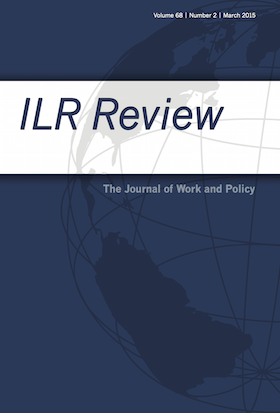
Firm Wage Premia, Industrial Relations, and Rent Sharing in Germany
in: ILR Review, No. 5, 2020
Abstract
The authors use three distinct methods to investigate the influence of industrial relations on firm wage premia in Germany. First, ordinary least squares (OLS) regressions for the firm effects from a two-way fixed-effects decomposition of workers’ wages reveal that average premia are larger in firms bound by collective agreements and in firms with a works council, holding constant firm performance. Next, recentered influence function (RIF) regressions show that premia are less dispersed among covered firms but more dispersed among firms with a works council. Finally, in an Oaxaca–Blinder decomposition, the authors find that decreasing bargaining coverage is the only factor they consider that contributes to the marked rise in premia dispersion over time.
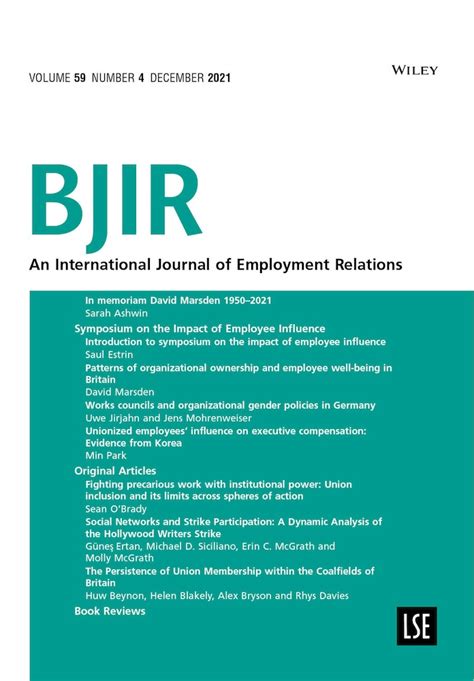
Birds, Birds, Birds: Co-worker Similarity, Workplace Diversity and Job Switches
in: British Journal of Industrial Relations, No. 3, 2020
Abstract
We investigate how the demographic composition of the workforce along the sex, nationality, education, age and tenure dimensions affects job switches. Fitting duration models for workers’ job‐to‐job turnover rate that control for workplace fixed effects in a representative sample of large manufacturing plants in Germany during 1975–2016, we find that larger co‐worker similarity in all five dimensions substantially depresses job‐to‐job moves, whereas workplace diversity is of limited importance. In line with conventional wisdom, which has that birds of a feather flock together, our interpretation of the results is that workers prefer having co‐workers of their kind and place less value on diverse workplaces.
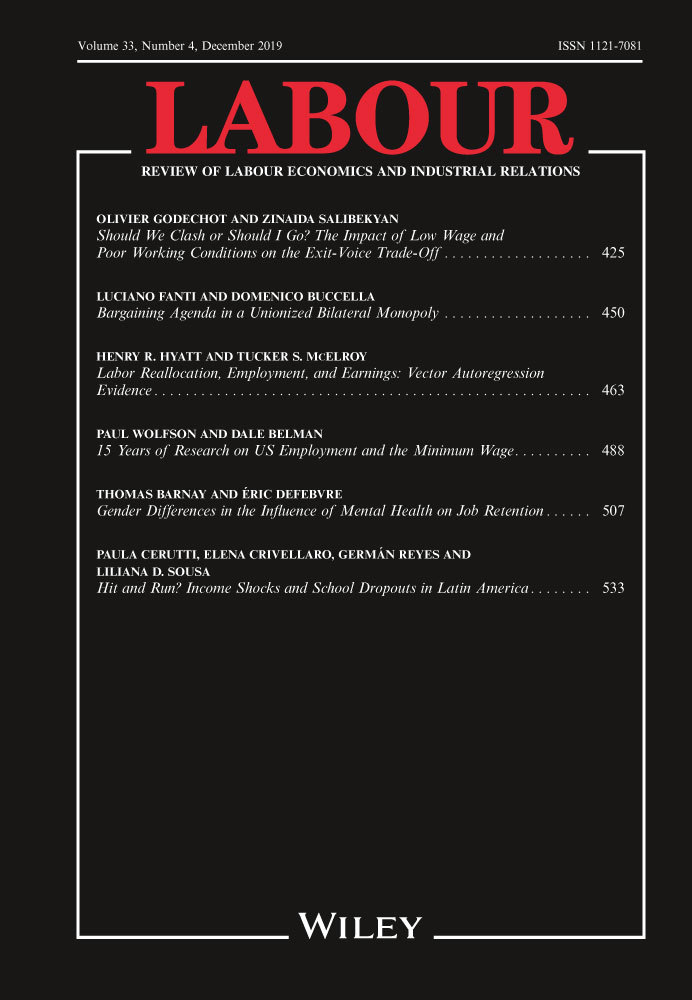
Who Buffers Income Losses after Job Displacement? The Role of Alternative Income Sources, the Family, and the State
in: LABOUR: Review of Labour Economics and Industrial Relations, No. 3, 2020
Abstract
Using survey data from the German Socio‐Economic Panel (SOEP), this paper analyses the extent to which alternative income sources, reactions within the household context, and redistribution by the state attenuate earnings losses after job displacement. Applying propensity score matching and fixed effects estimations, we find that income from self‐employment reduces the earnings gap only slightly and severance payments buffer losses in the short run. On the household level, we find little evidence for an added worker effect whereas redistribution by the state within the tax and transfer system mitigates income losses substantially.

Why Is there Resistance to Works Councils In Germany? An Economic Perspective
in: Economic and Industrial Democracy, No. 3, 2020
Abstract
<p>Recent empirical research generally finds evidence of positive economic effects for works councils, for example with regard to productivity and – with some limitations – to profits. This makes it necessary to explain why employers’ associations have reservations about works councils. On the basis of an in-depth literature analysis, this article shows that beyond the generally positive findings, there are important heterogeneities in the impact of works councils. The authors argue that those groups of employers that tend to benefit little from employee participation in terms of productivity and profits may well be important enough to shape the agenda of their employers’ organization and have even gained in importance within their organizations in recent years. The authors also discuss the role of deviations from profit-maximizing behavior like risk aversion, short-term profit-maximization and other non-pecuniary motives, as possible reasons for employer resistance.</p>
Working Papers
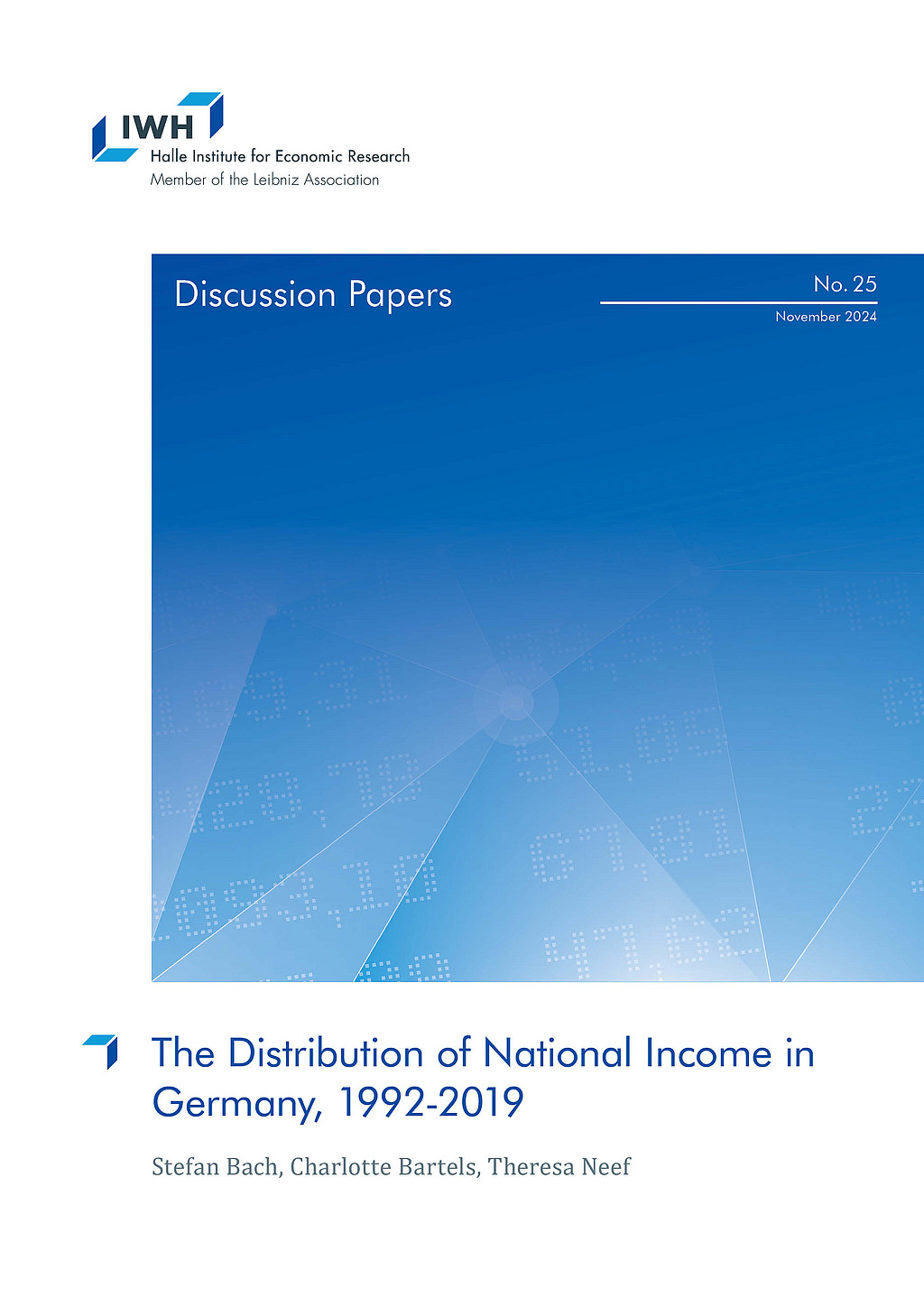
The Distribution of National Income in Germany, 1992-2019
in: IWH Discussion Papers, No. 25, 2024
Abstract
<p>This paper analyzes the distribution and composition of pre-tax national income in Germany since 1992, combining personal income tax returns, household survey data, and national accounts. Inequality rose from the 1990s to the late 2000s due to falling labor incomes among the bottom 50% and rising incomes in the top 10%. This trend reversed after 2007 as labor incomes across the bottom 90% increased. The top 1% income share, dominated by business income, remained relatively stable between 1992 and 2019. A large share of Germany’s top 1% earners are non-corporate business owners in labor-intensive professions. At least half of the business owners in P99-99.9 and a quarter in the top 0.1% operate firms in professional services – a pattern mirroring the United States. From 1992 to 2019, Germany’s top 0.1% income concentration exceeded France’s and matched U.S. levels until the late 2000s.</p>
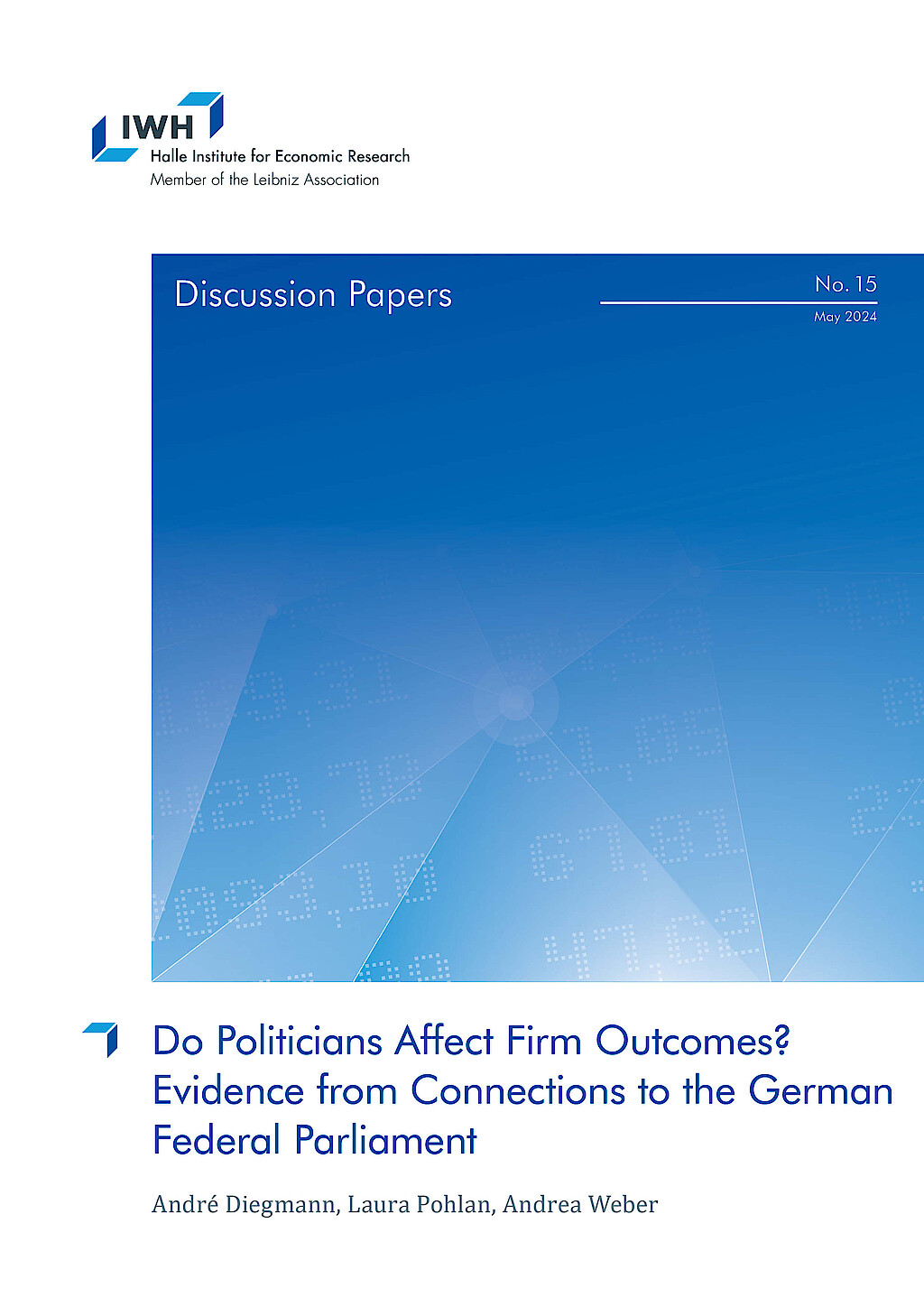
Do Politicians Affect Firm Outcomes? Evidence from Connections to the German Federal Parliament
in: IWH Discussion Papers, No. 15, 2024
Abstract
<p>We study how connections to German federal parliamentarians affect firm dynamics by constructing a novel dataset linking politicians and election candidates to the universe of firms. To identify the causal effect of access to political power, we exploit (i) new appointments to the company leadership team and (ii) discontinuities around the marginal seat of party election lists. Our results reveal that connections lead to reductions in firm exits, gradual increases in employment growth without improvements in productivity. Adding information on credit ratings, subsidies and procurement contracts allows us to distinguish between mechanisms driving the effects over the politician’s career.</p>
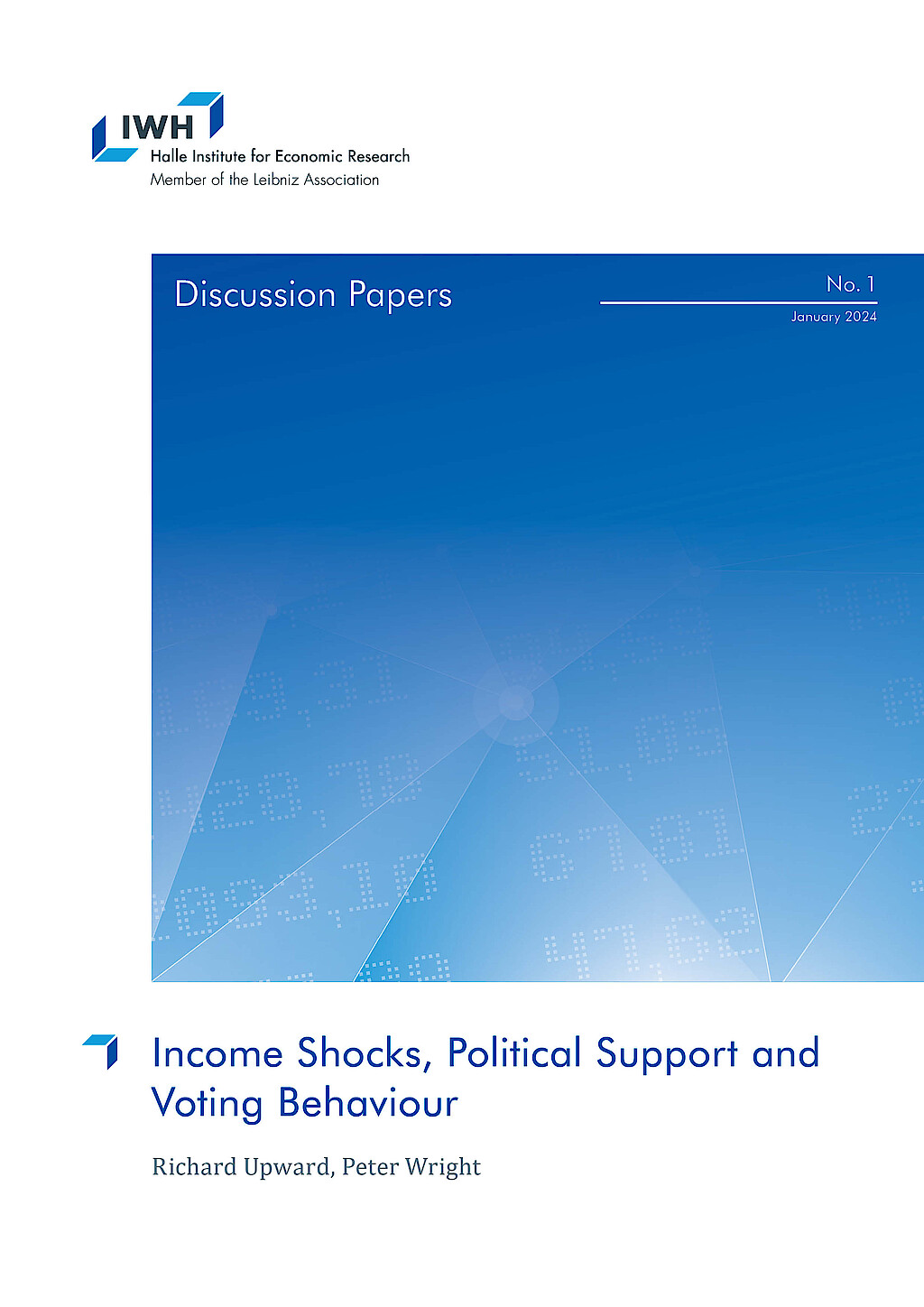
Income Shocks, Political Support and Voting Behaviour
in: IWH Discussion Papers, No. 1, 2024
Abstract
We provide new evidence on the effects of economic shocks on political support, voting behaviour and political opinions over the last 25 years. We exploit a sudden, large and long-lasting shock in the form of job loss and trace out its impact on individual political outcomes for up to 10 years after the event. The availability of detailed information on households before and after the job loss event allows us to reweight a comparison group to closely mimic the job losers in terms of their observable characteristics, pre-existing political support and voting behaviour. We find consistent, long-lasting but quantitatively small effects on support and votes for the incumbent party, and short-lived effects on political engagement. We find limited impact on the support for fringe or populist parties. In the context of Brexit, opposition to the EU was much higher amongst those who lost their jobs, but this was largely due to pre-existing differences which were not exacerbated by the job loss event itself.
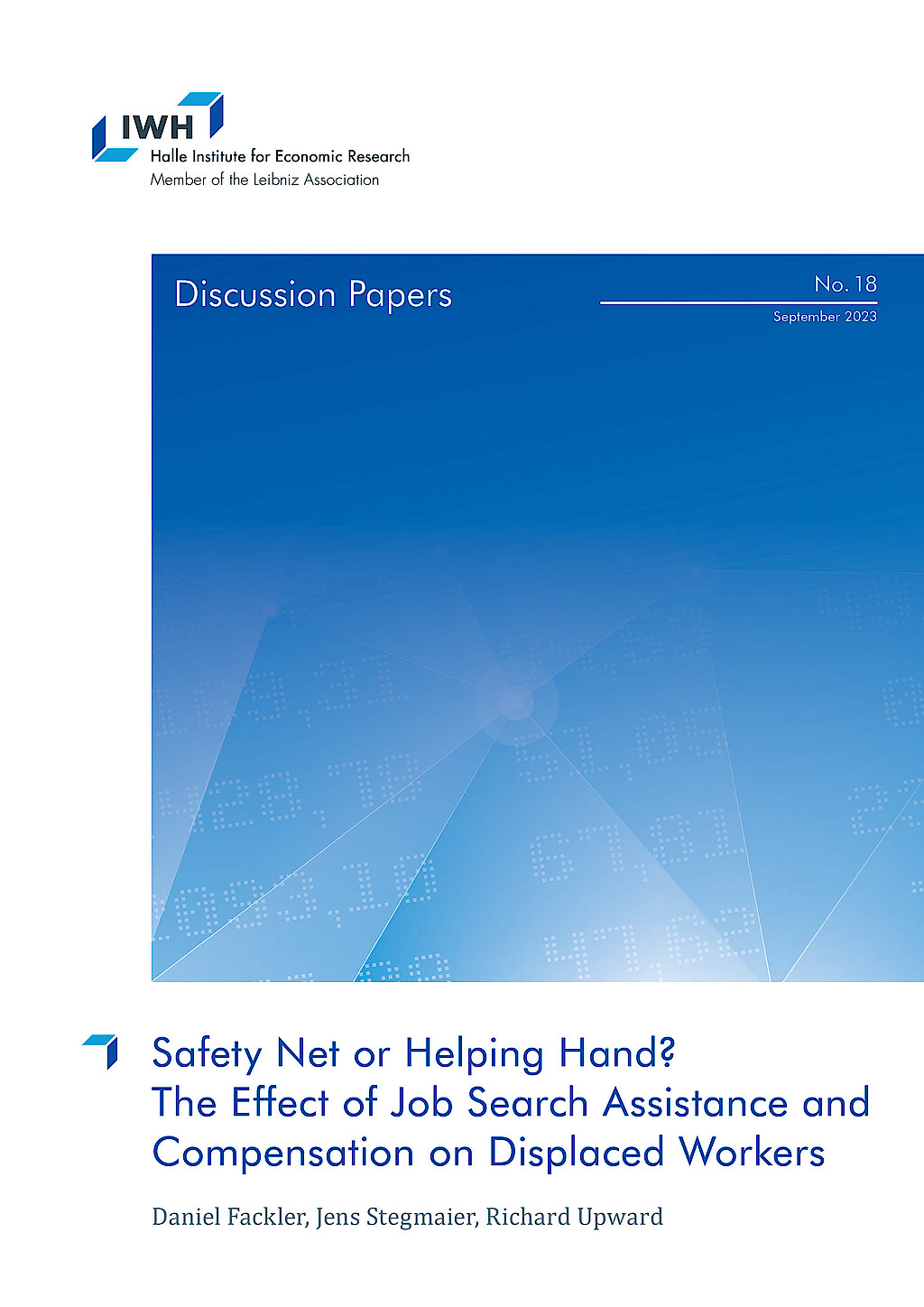
Safety Net or Helping Hand? The Effect of Job Search Assistance and Compensation on Displaced Workers
in: IWH Discussion Papers, No. 18, 2023
Abstract
We provide the first systematic evidence on the effectiveness of a contested policy in Germany to help displaced workers. So-called “transfer companies” (<i>Transfergesellschaften</i>) employ displaced workers for a fixed period, during which time workers are provided with job-search assistance and are paid a wage which is a substantial fraction of their pre-displacement wage. Using rich and accurate data on workers’ employment patterns before and after displacement, we compare the earnings and employment outcomes of displaced workers who entered transfer companies with those that did not. Workers can choose whether or not to accept a position in a transfer company, and therefore we use the availability of a transfer company at the establishment level as an IV in a model of one-sided compliance. Using an event study, we find that workers who enter a transfer company have significantly worse post-displacement outcomes, but we show that this is likely to be the result of negative selection: workers who lack good outside opportunities are more likely to choose to enter the transfer company. In contrast, ITT and IV estimates indicate that the use of a transfer company has a positive and significant effect on employment rates five years after job loss, but no significant effect on earnings. In addition, the transfer company provides significant additional compensation to displaced workers in the first 12 months after job loss.
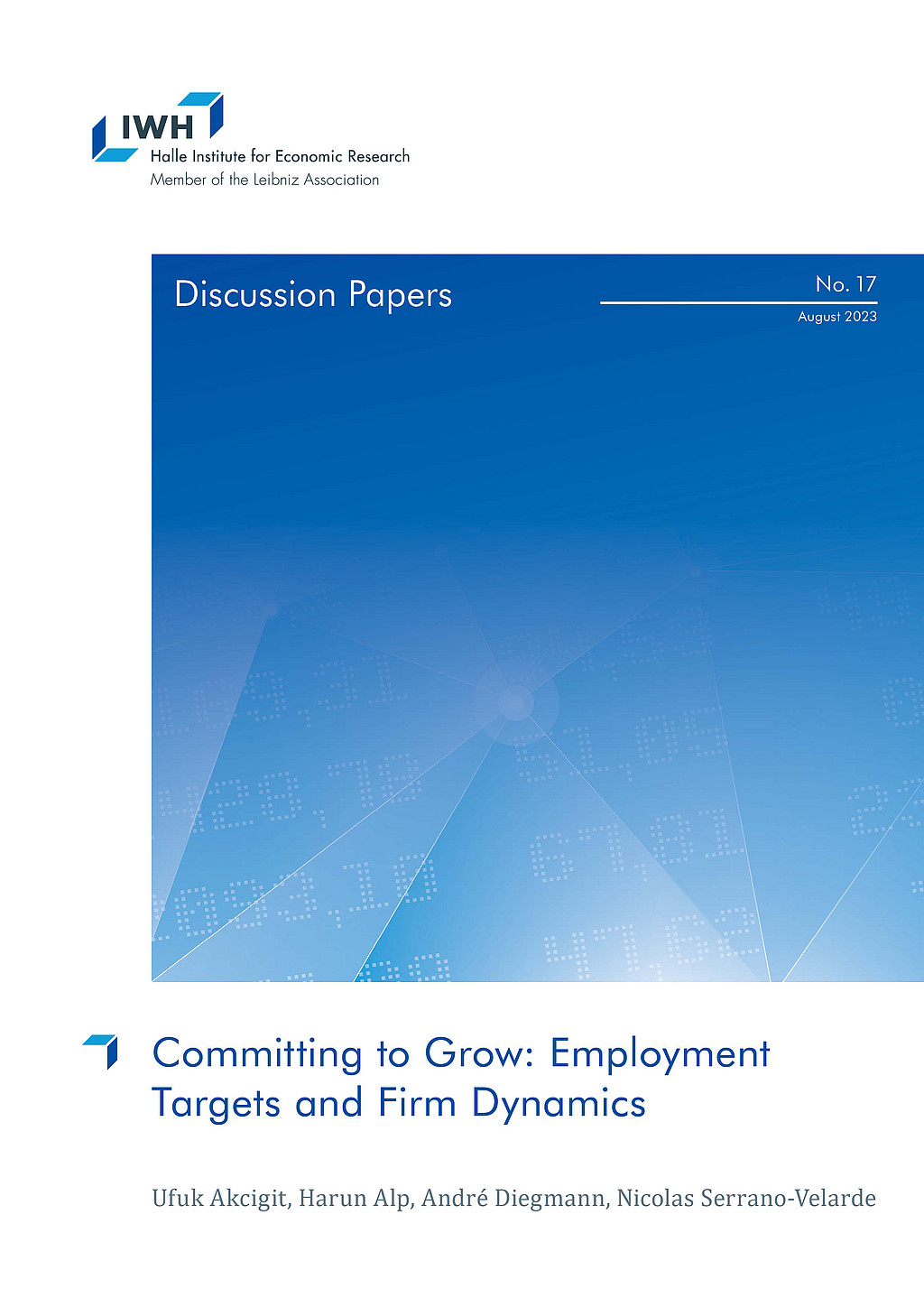
Committing to Grow: Employment Targets and Firm Dynamics
in: IWH Discussion Papers, No. 17, 2023
Abstract
<p>We examine effects of government-imposed employment targets on firm behavior. Theoretically, such policies create “polarization,“ causing low-productivity firms to exit the market while others temporarily distort their employment upward. Dynamically, firms are incentivized to improve productivity to meet targets. Using novel data from East German firms post-privatization, we find that firms with binding employment targets experienced 25% higher annual employment growth, a 1.1% higher annual exit probability, and 10% higher annual productivity growth over the target period. Structural estimates reveal substantial misallocation of labor across firms and that subsidizing productivity growth would yield twice the long term increases in employment.</p>
















